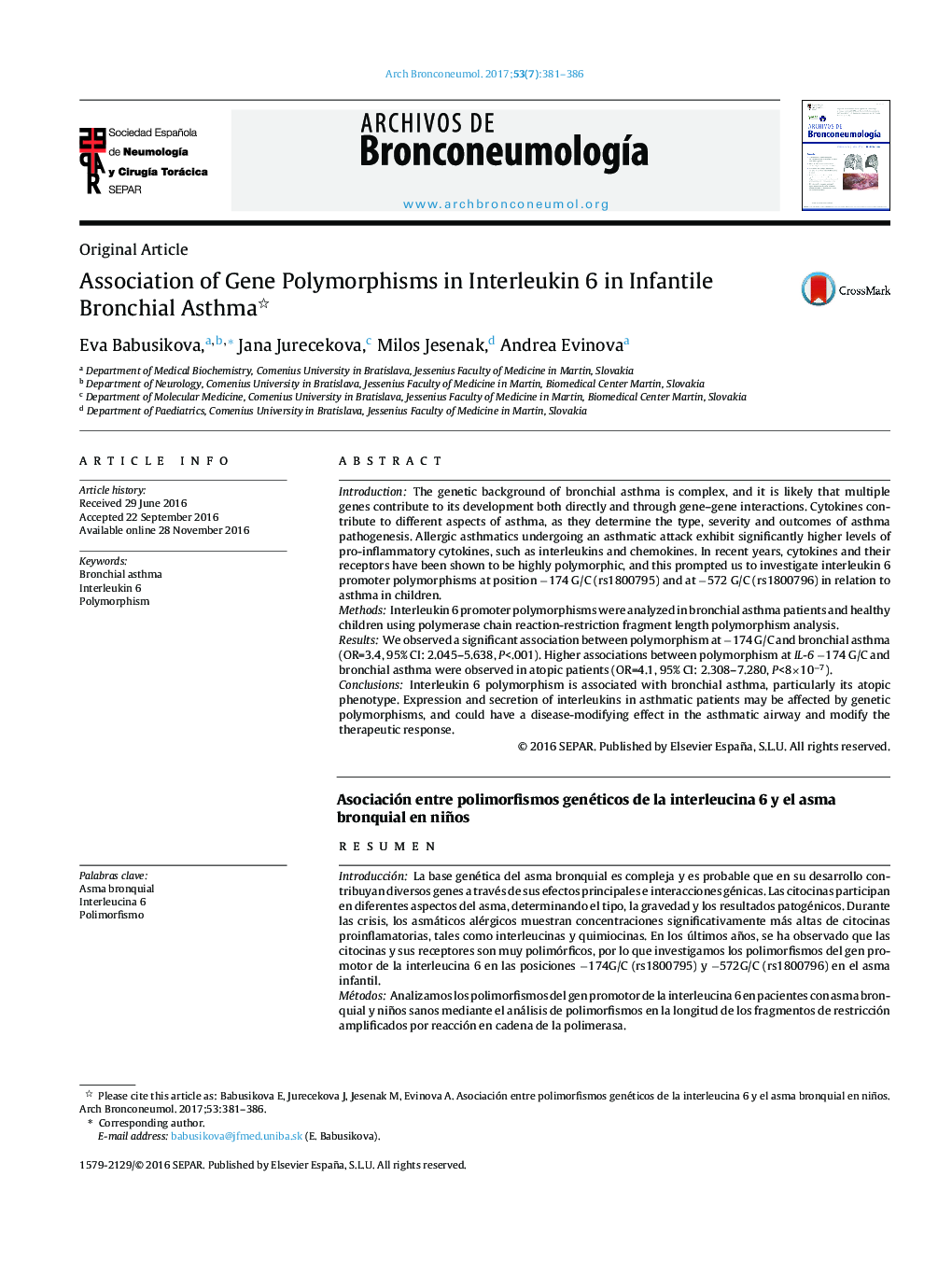| کد مقاله | کد نشریه | سال انتشار | مقاله انگلیسی | نسخه تمام متن |
|---|---|---|---|---|
| 5724281 | 1411488 | 2017 | 6 صفحه PDF | دانلود رایگان |

IntroductionThe genetic background of bronchial asthma is complex, and it is likely that multiple genes contribute to its development both directly and through gene-gene interactions. Cytokines contribute to different aspects of asthma, as they determine the type, severity and outcomes of asthma pathogenesis. Allergic asthmatics undergoing an asthmatic attack exhibit significantly higher levels of pro-inflammatory cytokines, such as interleukins and chemokines. In recent years, cytokines and their receptors have been shown to be highly polymorphic, and this prompted us to investigate interleukin 6 promoter polymorphisms at position â174 G/C (rs1800795) and at â572 G/C (rs1800796) in relation to asthma in children.MethodsInterleukin 6 promoter polymorphisms were analyzed in bronchial asthma patients and healthy children using polymerase chain reaction-restriction fragment length polymorphism analysis.ResultsWe observed a significant association between polymorphism at â174 G/C and bronchial asthma (OR=3.4, 95% CI: 2.045-5.638, P<.001). Higher associations between polymorphism at IL-6 â174 G/C and bronchial asthma were observed in atopic patients (OR=4.1, 95% CI: 2.308-7.280, P<8Ã10â7).ConclusionsInterleukin 6 polymorphism is associated with bronchial asthma, particularly its atopic phenotype. Expression and secretion of interleukins in asthmatic patients may be affected by genetic polymorphisms, and could have a disease-modifying effect in the asthmatic airway and modify the therapeutic response.
ResumenIntroducciónLa base genética del asma bronquial es compleja y es probable que en su desarrollo contribuyan diversos genes a través de sus efectos principales e interacciones génicas. Las citocinas participan en diferentes aspectos del asma, determinando el tipo, la gravedad y los resultados patogénicos. Durante las crisis, los asmáticos alérgicos muestran concentraciones significativamente más altas de citocinas proinflamatorias, tales como interleucinas y quimiocinas. En los últimos años, se ha observado que las citocinas y sus receptores son muy polimórficos, por lo que investigamos los polimorfismos del gen promotor de la interleucina 6 en las posiciones â174G/C (rs1800795) y â572G/C (rs1800796) en el asma infantil.MétodosAnalizamos los polimorfismos del gen promotor de la interleucina 6 en pacientes con asma bronquial y niños sanos mediante el análisis de polimorfismos en la longitud de los fragmentos de restricción amplificados por reacción en cadena de la polimerasa.ResultadosSe observó una asociación significativa entre el polimorfismo en â174G/C y el asma bronquial (OR = 3,4; IC 95%: 2,045-5,638; p < 0,001). En pacientes atópicos se observó mayor asociación del polimorfismo del IL-6 â174G/C (OR = 4,1; IC 95%: 2,308-7,280; p < 8,10â7).ConclusionesEl polimorfismo de la interleucina 6 se asocia con el asma bronquial, especialmente con el fenotipo atópico. En pacientes asmáticos, la expresión y la secreción de interleucinas pueden resultar afectadas por polimorfismos génicos, lo que podrÃa tener efectos modificadores de la enfermedad en la vÃa aérea y modificar la respuesta terapéutica.
Journal: Archivos de BronconeumologÃa (English Edition) - Volume 53, Issue 7, July 2017, Pages 381-386